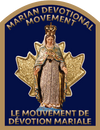June 28: OUR LADY OF THE ANGELUS
The institution of the Angelus occurred June 28-29, about 1456 by Pope Callistus. The Turks had been threatening Europe and it was the Pope’s request that the Faithful recite the Angelus for the safety of Christendom against the Turks, and for peace.
The Angelus was first recited about sunset, a general practice throughout Europe in the first half of the 14th century, recommended by Pope John XXI. The morning Angelus seems to have started somewhat later, again, for peace. The recitation of the midday Angelus began sometime in the 14thcentury; it was called the “Peace Bell.”
The present-day custom of reciting the Angelus is a short practice of devotion in honor of the Incarnation, repeated three times each day, morning, noon, and evening, at the sound of the church bell. It is curious how the Angelus is associated historically with the invasion of the Turks, again, in 1683, when they laid siege to Vienna. Emperor Leopold of Austria fled and begged for assistance and help from John Sobieski, a great Polish general, who gathered his army and hastened to the rescue, stopping at one of Our Lady’s shrines in Poland for blessing. On September 11, Sobieski was on the heights of Kahlenberg, near Vienna, and the next day engaged in battle with the Turks. Brilliantly leading his troops, he forced the Turks into a trap, but the number of the foe was so great that he could not penetrate their ranks; then Sobieski’s cavalry turned in retreat, interpreted by the Turks as flight. The Turks rushed forward; but were re-attacked. The shots and cries of Sobieski’s men threw terror into the Turks, when they learned that Sobieski himself, “The Northern Lion” was on the battlefield, for he had defeated the Turks in Poland on previous occasions, and they feared him; therefore, the Turks fled panic-stricken. The battle raged for a time; all along the front was Sobieski everywhere commanding, fighting, encouraging his men and urging them forward. The Turks were finally defeated, Vienna and Christendom saved, and the news was sent to Pope Innocent XI in Rome.
Sobieski was a humble man, for in the height of his greatest victory, in a letter to Pope Innocent XI, he said it was God’s cause he was fighting for, and Mary’s honor. His message to the Pope on the victory read: “I came, I saw, but God and Mary conquered.”
The day after the Battle; Sobieski entered Vienna victoriously. Later he pursued the Turks into Hungary, again attacking them and defeating them. The Turkish threat to Europe had vanished forever. Pope Innocent XI after the battle of Vienna requested the whole Christian world to recite the Angelus for peace.
The Angelus takes on special significance today because Communism has duplicated in many respects the pattern of the Turkish invasion of Europe. In our own time, we see the Moslem invasion in Europe.
This 500th anniversary of the institution of the Angelus by Pope Callistus III should be a reminder to recite the centuries-old prayer for peace and for the protection of the Christian world from the menace of Communism.
From the Woman in Orbit - A Timeless Marian Treasure Compiled By Sr. Manetta Lamberty, S.C.C.
Apparition Evangelization - start your journey today with a FREE Marian Consecration ebook HERE
The Memorare and the Angelus HERE
Do you pray the Rosary? For the most powerful way to pray, click HERE
2033: Hope, Meaning and Purpose Video
A priest discovers a pig chewing on a Rosary. What he does next transforms his dying parish into a National Shrine!
WATCH BRIDGE OF ROSES ONLINE WITH UNLIMITED STREAMING ON VIMEO HERE
RENT OR PURCHASE BRIDGE OF ROSES ON MDMTV HERE
BUY BRIDGE OF ROSES DVD HERE
Mary's Love Letter - HERE
The story behind the reprinting of the Woman in Orbit HERE
The Woman in Orbit - Mary’s Feasts Every Day Everywhere HERE


